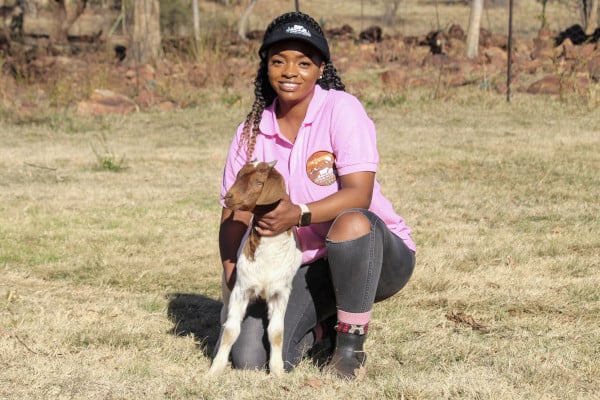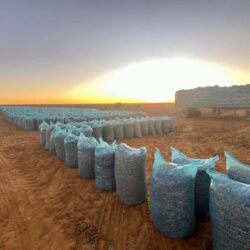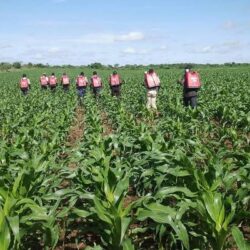As a third-generation farmer, Hlobisile Yende follows in the footsteps of her father and grandfather. Since starting farming full-time three years ago without formal experience, Hlobisile has learnt a lot through her father’s teachings, participation in agricultural groups, and online research. Peter Mashala visited her on her family farm in Heidelberg.
The Covid-19 pandemic in 2020 changed the way many people worked and lived, but it also gave them the opportunity to reflect on their lives. One of those people was Hlobisile Bathabile Yende, a 27-year-old farmer from Diepkloof, Soweto.
Before joining her dad on his 1,064-hectare farm in Heidelberg, Hlobisile, affectionately known as Hlobi, worked as an account manager at a PR and events company in Johannesburg.
Since 2020, she has taken over the farm and has made a success of the mixed operation consisting of cattle, sheep, goats and chickens, with 120ha under maize production. The farm has 22 full-time and part-time employees, and its mostly mountainous and rocky terrain is used for grazing.
Hlobi’s father, Charles Yende, founded the farming business in 2010. Charles grew up in Piet Retief, Mpumalanga, where his father, a grain and livestock farmer, groomed him. Even after he moved to Johannesburg to start a teaching career, he continued working with his dad in Piet Retief.
A few years later, Charles acquired his own farm in Nigel, and as the business her grew it became too small. He then leased the Heidelberg property from the Department of Agriculture, Land Reform & Rural Development. Since the death of Hlobi’s grandfather, her dad has taken charge of the Piet Retief farm and Hlobi runs the Heidelberg property.

Besides a master’s degree social science with a focus on criminology and psychology, Hlobi has an honours degree in criminology and a Master of Business Administration (MBA) from the Gordon Institute of Business Science (GIBS). She is studying for a master’s degree in criminology.
“Eventually, I would like to earn an agricultural degree, but I hope to continue my studies and even earn a doctorate. Dr Farmer has an appealing ring,” she says.
The Covid-19 lockdown allowed her to spend more time on the farm with her dad. “With some time on my hands, I started helping my dad with some of his stuff, including his books,” she says.
“I realised as I examined the books that all his other businesses, such as his transport business and motor spares shop, were up to date. They were even subsidised through the Covid relief fund.”
The farm was not, however, so she decided to help her father apply for relief. “My dad did not lay off any employees during the pandemic, but he found ways to cover the costs.”

As she worked on the application documents, Hlobi found the farm was not operating professionally. In fact, the company was on the verge of being deregistered by the Companies and Intellectual Property Commission and its paperwork was disorganised.
“Due to his long business experience, my dad kept receipts and other stuff. So, I consulted an accountant and we fixed the books,” she says. In the process, she became increasingly enamoured with farming. “I spent quite a bit of time there because of the quiet farm and the pleasant working environment.”
Getting the books organised opened doors for Hlobi. She took part in the Corteva Agriscience women in agriculture programme offered by GIBS, and after seeing the changes she introduced at the farm, her dad trusted her with more responsibilities. Hlobi now oversees the entire business.
The cattle herd consists of mixed breeds but Hlobi says they plan to concentrate on Simmentalers. “We use Simmentaler and Simbra bulls, which brings us excellent results,” she says. They sell their weaners to the nearby Karan Beef feedlot.
Hlobi and her dad chose Simmentalers because they are dual-purpose animals with good milk and beef-production capabilities. “Also, a Simmentaler has a pleasant temperament, which makes it easy to manage, and both bulls and heifers are weaned at six months old at an average weight of 242 kilograms,” explains Hlobi. Furthermore, Simmentalers are ideal for crossbreeding due to their hybrid vigour.
The farm’s sheep and goats are marketed informally in the nearby Rathanda township. “We have Kalahari and Boer goats, as well as Merino sheep. We haven’t started yet, but we plan to enter the wool market soon,” says Hlobi.

As part of her diversification programme, Hlobi planted butternuts last year after an experiment with soybeans failed due to post-harvest losses resulting from a lack of equipment. In her view, soybeans require specialised harvesters.
Butternuts were chosen because they are in demand and can be grown on dry land without irrigation. “We have a huge water challenge here since our borehole needs some repairs, which will be a costly process,” says Hlobi.
Nevertheless, planting butternuts on dry land was not a bad idea because the farm receives rainfall of 750mm annually, on average. She planted 1ha of butternuts in December and began harvesting them in March. She planted a hybrid cultivar called Pluto from Sakata, which germinated 100%, and produced about 40 tons.
“Because I used kraal manure, I didn’t spend much money on fertilizers. In fact, it wasn’t even planned because I decided to plant butternuts while we were preparing the soil for maize. It was a spontaneous decision but it paid off,” says Hlobi.
“After planting in December, everything went well until we had a few weeks without rain in February. There was a heatwave, and I was terrified that I would lose my entire crop. However, when rain came the crop recovered surprisingly well.”

Thanks to her strong social media network, Hlobi had pre-orders by the time she started harvesting. She delivered 600 7kg bags a week to Boxer stores. “This experience taught me about producing the correct sizes and quality for different markets,” she says.
Her first delivery to a processing client in Pretoria, a full 8-ton truck, was rejected. “We drove there and they took some samples, then rejected the whole truck. It was such a shock. This was due to the moisture content.” They needed butternuts with low moisture content and a certain size, she says, because too much moisture shortens their shelf life.
Luckily, butternut can be dried in the sun for a few days without spoiling, and once it was dried she sorted it by size for different markets. The smaller fruit was sold to retailers while the larger ones were processed.
Hlobi has also been accredited to cultivate hemp on 50ha. To prepare for production, she is procuring seed and conducting a feasibility study to determine which part of the farm is best suited to hemp farming. “There is a lot of money to be made in this business, especially when it comes to CBD,” she says.
She also wants to venture into beauty products and own a natural beauty spa. “We have a lot of blue gum trees on the farm, which provide eucalyptus oil,” she says. Another plan is to put beehives on the farm. “Eucalyptus honey is a premium product, and beeswax is also an excellent by-product for beauty products. Also, the bees pollinate maize and butternuts,” says Hlobi.
She hopes her son, Lethu, will continue her family legacy. To empower not only her son, but also children growing up without a farming background, she has written a children’s book about agriculture. “The book contains agricultural basics that I hope will benefit many kids, including my son,” she says.





